VIII. Compliance
Responsibilities
Objective researcher or “companheria”
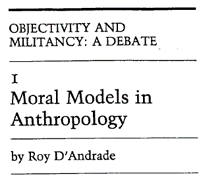
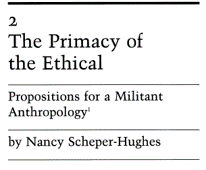
In 1995 Roy D’Andrade and Nancy Scheper-Hughes had a debate on ‘objective science’ and ‘moral relativism’ vs. ‘politically committed/morally and engaged’ anthropology.
Follow the arguments in the discussion and find your own position:
- „I believe that anthropology can maintain its moral authority only on the basis of empirically demonstrable truths.“ (Roy D‘Andrade)
- Anthropologists should become morally and politically engaged in their informants’ struggles and throw out an interfering moral relativism.” (Nancy Scheper-Hughes)
- “If we cannot begin to think about social institutions and practices in scientific-objective terms, then anthropology will be even weaker.” (Marvin Harris)
- “We can never become companheiros and companheiras. We are always outsiders – and there lies our power, as dangerous as it may be, and the source of our interpellation and responsiveness.” (Vincent Crapanzano)
- „I see the task of anthropology as developing a mobile sensitivity to cultural difference that nevertheless insists on defending minimal modern human rights (freedom from hunger and torture and the right to survive as a people).” (Aihwa Ong)
Good reads:
• D‘Andrade, Roy. 1995. Moral Models in Anthropology. Current Anthropology 36, 3, June, 399-408.
• Scheper-Hughes, Nancy. 1995. The Primacy of the Ethical. Propositions for a Militant Anthropology. Current Anthropology 36, 3, June, 409-440 (including comments).
• Low, Setha M. & Sally Engle Merry. 2010. Engaged Anthropology: Diversity and Dilemmas. Current Anthropology 51, Suppl 2, Oct. [Low and Merry distinguish six forms of anthropological engagement in the US: (1) sharing & support, (2) teaching and public education, (3) social critique, (4) collaboration (5) advocacy, (6) activism ].
Responsibilities towards Funders, Governments and Gatekeepers (ASA 2011)
Tips:
Researchers should negotiate research space concerning:
• Full disclosure of the sources of funds, personnel, aims and purposes of the research;
• Respect for their professional expertise and the integrity of their research results;
• Their ability to protect the rights and interests of research participants; to make all ethical decisions in their research; and their (and other parties’) rights in data collected, in publications, copyrights and royalties. (see ASA 2011)
• If doing consulting: plan + price additional days in the field… (why?)
“Ethnographers should clarify in advance the respective roles, rights and obligations of sponsor, funder, employer and researcher:
- not to promise or imply acceptance of conditions which would be contrary to professional ethics… or competing commitments. Where conflicts seem likely, they should refer sponsors or other interested parties to relevant professional guidelines;
- Whilst respecting gatekeepers’ legitimate interests, researchers should adhere to the principle of obtaining informed consent from their direct interlocutors.
- Researchers should be wary of inadvertently disturbing the relationship between subjects and gatekeepers since that will continue long after the researcher has left the field.” (ASA 2011)
- Point to Ponder: Dittmer/Lorenz (2018: 36) point out: “In order to gain the necessary access to the field, a certain ’complicity’ with the ‘ruling’ actors is [..] almost always necessary. […] Thus, on the one hand, the accesses are necessary, but on the other hand, they inevitably have a corrupting effect.” (my translation).
Good reads:
• Joan Cassell, “Case 17: The Case of the Damaged Baby, Case 20: Power to the People; “Case 22: Forbidden Knowledge ,” [see annex…]
Professional Guidelines for Anthropologists in Practice
Working Group Development Anthropology (AG Entwicklungsethnologie/ Germany)
Buzz Group:
From employer-employee to professional-client nexus – and back
•”If the company [..]asks that the results of the research [..] be kept confidential, [the anthropologist] can appeal to her professional code and say that an anthropologist is not supposed to consent to a secrecy clause.
•In this way, she subjects the company to the collective coercion of the impersonal standards of her moral community.
•Thus, her escape to a moral high ground requires that the politics of employer versus employee give way to the politics of professional versus client.
•The client may, of course, reject the professional service offered (”for you, ten others without a secrecy clause!”) and thereby return the political issue to the employer-employee nexus.” (Pels 1999:103)
• -> How would you resolve that conflict?
AGEE: Ethical guidelines of the Working Group Development Anthropology -serving three ends:
- “negotiate minimum standards of professional ethicsin the contract guidelines(‘Terms of Reference’) with contracting authorities before a contract is awarded, which can be referred to in case of conflict (basis for negotiation);
- to have a yardstick for ethically conscious and justified decisions and actions during the assignment (guideline);
- to be measured against these guidelines by colleagues, clients and local groups after the assignment (benchmark).” (AGEE 2001:11)
Freedom of research and corresponding responsibility
Scientific Integrity, Individual Conduct and Public Trust (DFG /Germany)
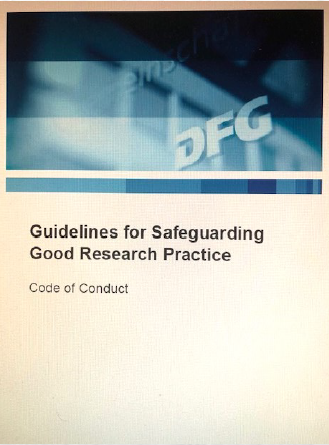
Guidelines for Safeguarding Good Resesarch Practice: Front Page.
Photo: M. Schönhuth 2020.
The German Research Foundation (DFG) has launched guidelines for safeguarding good research practice:
- “Scientific integrity forms the basis for trustworthy research.
- It is an example of academic voluntary commitment that encompasses a respectful attitude towards peers, research participants, animals, cultural assets, and the environment, and strengthens and promotes vital public trust in research.
- The constitutionally guaranteed freedom of research is inseparably linked to a corresponding responsibility. Taking this responsibility into full account and embedding it in individual conduct is an essential duty for every researcher and for the institutions where research is carried out.” [DFG 2019b: Preamble: 9]
Good reads:
• DFG (German Research Foundation). 2019b. Guidelines for Safeguarding Good Research Practice. Code of Conduct: Preamble
• DFG (German Research Foundation) 2019c: Rules Of Procedure for Dealing With Scientific Misconduct.
Scientific Integrity
… and the Mead-Freeman Controversy
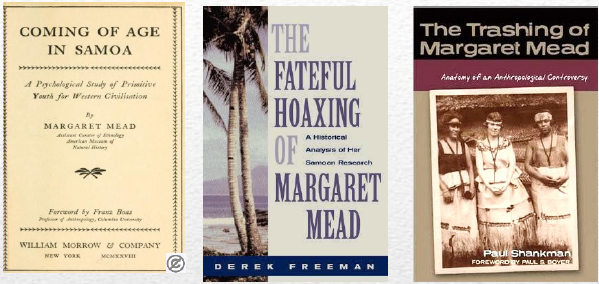
Fronts of the works discussed below in the Mead/Freeman debate. Photo1: https://archive.org. 2+3: M. Schönhuth 2020.
- Margaret Mead (1928) had described Samoan adolescents as not suffering from the typical “coming of age” crisis, …caused by the youths’ greater degree of sexual freedom in Samoa;
- In 1983 Derek Freeman published a book, in which he argued that Mead’s data and conclusions were wrong, and she was “fatefully hoaxed by her informants” (see also Freeman 1998).
- A detailed review of the controversy by Paul Shankman(2009) concludes that Mead was right, and Freeman cherry-picked his data and misrepresented both Mead and Samoan culture. (see also: Shankman 2013)
When do we speak of scientific misconduct? (DFG 2019c)
“Observance of the rules of good scientific practice is the basis of trustworthy research.[…] Scientific misconduct shall be deemed to occur ..if, in a research-relevant context, individuals intentionally or with gross negligence:
- make misrepresentations; by fabricating data and/or research findings; by falsifying data and/or research findings…
- claim others’ research achievements as their own without justification (by using others’ content without indicating the source (plagiarism); using others’ research approaches and ideas (idea theft), by sharing, without authorisation, others’ data, theories and findings with third parties; by claiming, or assuming without justification, authorship or co-authorship,[..]
- interfere with others’ research (sabotaging research activities; falsifying or removing,…research data or research documents…)” (DFG 2019c)
Good reads:
• Shankman, Paul. 2009. The Trashing of Margaret Mead. Anatomy of an Anthropological Controversy. Madison: University of Wisconsin Press. Excerpt
• BBC.2006. Tales from the Jungle. Margaret Mead. Documentary, Youtube
Governmental codes of conduct
Ethical Code for Agricultural Extension (Uganda)
- “Target users of the ethical code: individuals and organizations offering Agricultural Extension and Advisory Services (AEAS) to farmers and other actors in agricultural value chains in Uganda.
- Integrity: All AEAS providers should follow government policies and regulations; …should not engage in sexual or intimate behaviouror relationships with their clients; …desist from actions that confer a personal benefit outside their terms of employment.
- Diversity & Inclusion:recognisethat some farmers or clients are more vulnerable and may require additional support and assistance; strive to communicate with farmers or clients in a manner they can understand by avoiding technical jargon and using a language which some of them do not understand; …avoidfavouritism, political biases, religious sectarianism and tribalism.
- Cultural & Gender Sensitivity: dress code, conduct, and other behaviourshould be sensitive to the farmer’s or client’s beliefs, values and practices; employ approaches and methods that promote accessto services by men, women, male and female youth as well as the various ethnic categories of farmers or clients[….]” [Uganda/ Ministry of Agriculture n.d.]
Global Code of Conduct
Equitable research relationships in resource poor settings
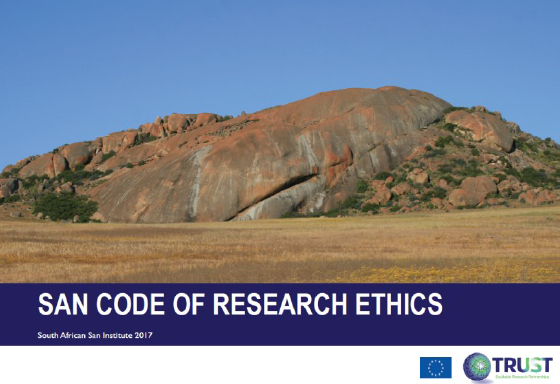
SAN Code of Research Ethics. Cover. Screenshot 15/10/20. M. Schönhuth.
- “The SAN Code of Research Ethics requires all researchers intending to engage with San communities to commit to four central values, namely fairness, respect, care and honesty, as well as to comply with a simple profess of community approval” (South African San Institute 2017.)
- A ‘landmark collaborative initiative’ towards a global code of conduct for research in resource poor settings is the EU-funded TRUST project launched in 2018.
- It addresses the challenges of so-called ‘ethics dumping'”[..] in which practices that would be ethically unacceptable in Europe are used in low-and middle-income countries where strong legal frameworks and ethics compliance mechanisms may be lacking.”
- […]”The TRUST project aims to prevent such practices, especially by giving vulnerable populations a voice and a central role in deciding how research should be conducted and used.” […]supporting long-term equitable research relationships between partners in lower-income and high-income settings based on fairness, respect, care and honesty.” [TRUST 2018]
- One output of this project is a “Fair Research Contract toolkit” that should support actors in low-and middle income settings to achieve equitable research contracts with research teams from high-income settings. [SEE: http://frcweb.cohred.org/self-assessment-tool/]
- Another output is the “San Code of Research Ethics” (see left).
Power differentials in writing in academia
The crux with co-authorship in career planning
Buzz Group:
Until a few years ago, the principle of ‘single authored pieces’ prevailed in the cultural and social sciences, especially when it came to career-relevant publications.
Today main funding bodies like the European Research Council (ERC) favor team-based research, with principal investigator (PI) and Postdocs/PhDs.
• What experiences have you made in your scientific environment?
• Which standards apply there, what is your personal strategy?
• What standards apply when publishing with senior-ranked researchers?
A white paper from the Publishing house Taylor & Francis in 2017 reveals:
- Co-authorshipis increasingly common: 74% of respondents reported that the typical number of authors per paper in their area of expertise is now two or more.
- The most common challenges of co-authorship are related to the order in which author names should be listed.
- In practice too much weight is placed on being a senior ranked researcher, the supervisor of a doctoral student, or a research grant holder.
- Just 18% have received training or guidance from their institution concerning academic authorship.
Good reads:
• El Kotni, Mounia, et al. 2020. “Introduction: Co-authorship as Feminist Writing and Practice.” Member Voices, Fieldsights, February 6. [The essays “push back against the long-held narrative that single-authored publications are the most valued and legitimized form of ethnographic work”]
• On misconduct on the part of the editors at the prestigious Journal of Ethnographic Theory, HAU, see E.C. Dunn 2018: The problem with Assholes; on the reply of the editor: da Col. 2019. New publishing demands new magic.
Abuse of power, bullying and harassment situations with supervisors
The Case of Tania Singer I
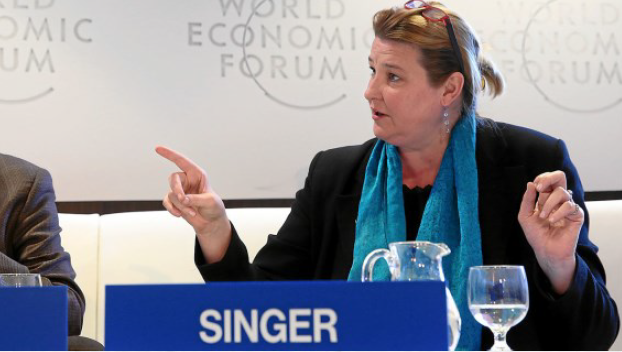
Moritz Hager/WORLD ECONOMIC FORUM/ Flickr (CC BY-NC-SA 2.0)
https://www.thecut.com/2018/08/worlds-top-empathy-researcher-revealed-as-a-bully.html#comments (08/03/2020)
In order to avoid a further escalation of the situation, Singer resigned from her director position in agreement with the Max Planck Society . She is now Professor and scientific Head of the Social Neuroscience Lab of the Max Planck Society in Berlin
https://en.wikipedia.org/wiki/Tania_Singer (retr. 4.5.2020)
Isn’t it ironic? World’s Top Empathy Researcher Revealed As a Bully
- “Tania Singer is known for her extensive, well-regarded research on the subject of human empathy. [..] Co-workers say that Singer, who is currently on a one-year sabbatical from her position as director of the Max Planck Institute for Human Cognitive and Brain Sciences in Leipzig, Germany, is known for leading meetings that leave her subordinates ‘in tears’, and that she’s been especially hard on employees who become pregnant. […]
- In early 2017, after years of more informal attempts to mediate the situation, lab members called for a meeting with MPG’s scientific advisory board to raise their concerns. This led to six meetings with a mediator, which lab members say did little to address the issues raised. In December, Singer announced her sabbatical.
- She has yet to comment publicly on this story, but previously acknowledged some mistakes in internal communications sent to MPG representatives, writing that ‘Problems associated to my exhaustion due to having to carry and be responsible for [a] huge and complex study’ were partly to blame for her behavior. As of now, Singer is expected to return to work in January 2019, working with ‘a new, smaller’ research group in Berlin.” The Cut-Online Magazine
The Case of Tania Singer II
Buzz Group:
• Take a look at that case of a renowned neuroscientist at a German research institution in 2018 (previous slide): In your opinion, has the case been dealt with satisfactorily?
• If you were affected as a junior researcher, would you know where to turn for support in your country / at your institution? Do you know of positive examples?
• Think of steps and structural measures that could be taken to improve the dependency situation within the scientific community, on the level of “prevention”, “protection” and”arbitration”.
• -> If you require further inspiration for structural measures, see: https://www.phdnet.mpg.de/news/2018/power-abuse-statement.
• -> For a list of ombudspersons in the German scientific community, see: https://ombudsman-fuer-die-wissenschaft.de/?lang=en.
Statement of the Max Planck PhDnet Steering Group 2018
- “We [… ] see the prevalence of power abuse and the difficulties to solve interpersonal conflicts as a structural problem of the academic system. The problem is caused by:
- steep hierarchies and multi-dependencies of young researchers on the one hand,
- high pressure to publish as well as a lack of training in leadership and personnel development of scientific leaders on the other hand.
- The lack of robust and trustworthy mechanisms to report and resolve conflicts makes it hard to help and protect victims of power abuse and harassment and even harder for perpetrators to receive honest feedback and learn from it. The existence of this problem has to be recognized by the academic system as a whole and we need to work on a solution together.” (Doctoral Researchers of the Max Planck Society)
Good reads:
• PhDnet Steering Group. 2018. Position Paper on Power Abuse and Conflict Resolution. (August).
• Kalman, Izzy. 2018. The True Irony of the Tania Singer Bullying Scandal. Posted Aug 15.
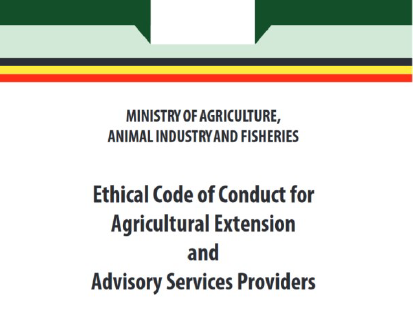
In a “Draft of Good Practice guidelines in collaborative research”, written for further discussion and reflection amongst EASA membership in 2020, Alice Tilche and Rita Astuti describe new forms of anthropological knowledge production in large, externally funded projects in which rights and responsibilities are often organized through vertical rather than horizontal structures. The guidelines “..seek to clarify the relationship between data production, data ownership and authorship in anthropology and to suggest some ground rules for ensuring fair working relations within projects. See: https://easaonline.org/newsletter/75-0120/guidelines.shtml.